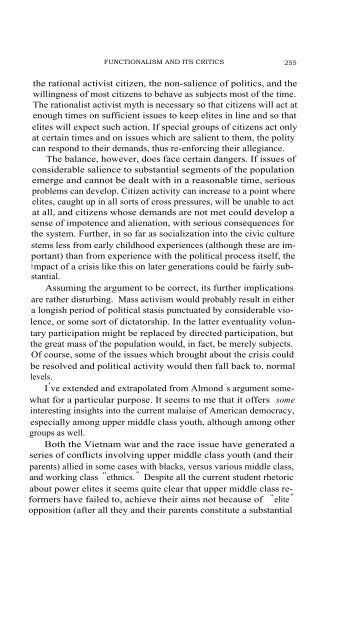FUNCTIONALISM AND ITS CRITICS - Intercollegiate Studies Institute
FUNCTIONALISM AND ITS CRITICS - Intercollegiate Studies Institute
FUNCTIONALISM AND ITS CRITICS - Intercollegiate Studies Institute
You also want an ePaper? Increase the reach of your titles
YUMPU automatically turns print PDFs into web optimized ePapers that Google loves.
<strong>FUNCTIONALISM</strong> <strong>AND</strong> <strong>ITS</strong> <strong>CRITICS</strong> 255<br />
the rational activist citizen, the non-salience of politics, and the<br />
willingness of most citizens to behave as subjects most of the time.<br />
The rationalist activist myth is necessary so that citizens will act at<br />
enough times on sufficient issues to keep elites in line and so that<br />
elites will expect such action. If special groups of citizens act only<br />
at certain times and on issues which are salient to them, the polity<br />
can respond to their demands, thus re-enforcing their allegiance.<br />
The balance, however, does face certain dangers. If issues of<br />
considerable salience to substantial segments of the population<br />
emerge and cannot be dealt with in a reasonable time, serious<br />
problems can develop. Citizen activity can increase to a point where<br />
elites, caught up in all sorts of cross pressures, will be unable to act<br />
at all, and citizens whose demands are not met could develop a<br />
sense of impotence and alienation, with serious consequences for<br />
the system. Further, in so far as socialization into the civic culture<br />
stems less from early childhood experiences (although these are important)<br />
than from experience with the political process itself, the<br />
impact of a crisis like this on later generations could be fairly substantial.<br />
Assuming the argument to be correct, its further implications<br />
are rather disturbing. Mass activism would probably result in either<br />
a longish period of political stasis punctuated by considerable violence,<br />
or some sort of dictatorship. In the latter eventuality voluntary<br />
participation might be replaced by directed participation, but<br />
the great mass of the population would, in fact, be merely subjects.<br />
Of course, some of the issues which brought about the crisis could<br />
be resolved and political activity would then fall back to. normal<br />
levels.<br />
I ' ve extended and extrapolated from Almond ' s argument somewhat<br />
for a particular purpose. It seems to me that it offers some<br />
interesting insights into the current malaise of American democracy,<br />
especially among upper middle class youth, although among other<br />
groups as well.<br />
Both the Vietnam war and the race issue have generated a<br />
series of conflicts involving upper middle class youth (and their<br />
parents) allied in some cases with blacks, versus various middle class,<br />
and working class " ethnics. " Despite all the current student rhetoric<br />
about power elites it seems quite clear that upper middle class reformers<br />
have failed to, achieve their aims not because of " elite "<br />
opposition (after all they and their parents constitute a substantial
















